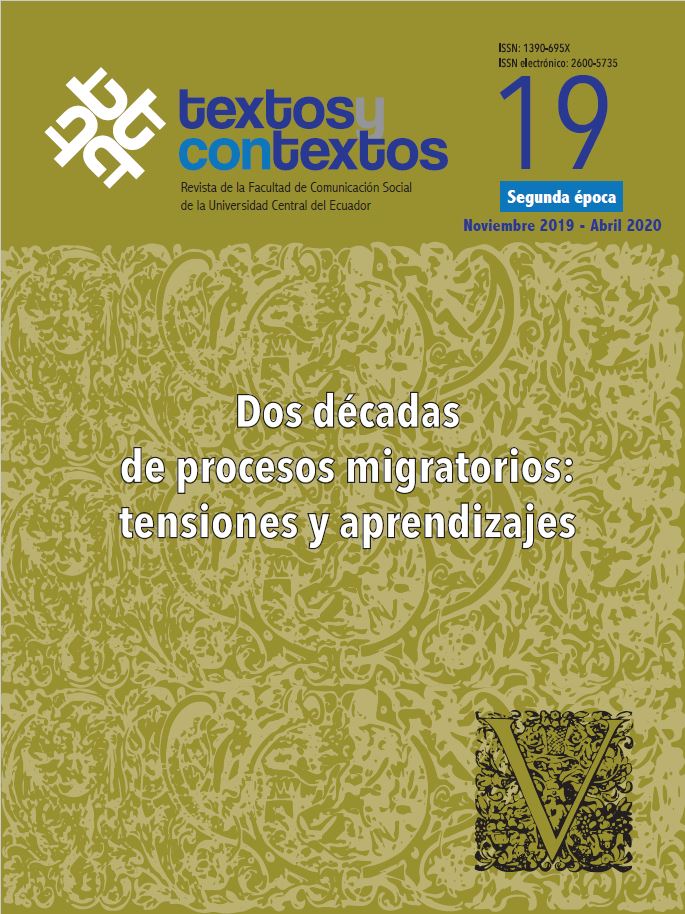Euromaidaners: social action of Ukrainian migrants in Warsaw
Main Article Content
Abstract
Maidan protests, in 2014, meant a cultural change in the way how Ukrainian society and state could be perceived by the world. Maidan square protests, in 2014, meant a cultural change regarding to how Ukrainian society and state could be perceived by the world. Maidan talked about a narrative of a political community based on values such as civil rights, democracy, solidarity and the Western way of living represented by the European Union. This movement had a strong impact on Ukrainians living in Poland. They acted as both formal and informal groups, as well as individuals. This article is about the civil activities of one Ukrainian migrant foundation, which was seen by local authorities and other non-governmental organizations as institutional representatives of the whole Ukrainian community. It determines Ukrainian migrants’ impact on Warsaw´s local life, focusing on the domain of non-governmental organizations and their roles and interaction with other social actors.
Downloads
Metrics
Article Details
References
Appadurai, A. (1996). Modernity at large. Cultural Dimensions of Globalization. University of Minnesota Press, Minneapolis
Baran D. (2016). Wizerunek Ukraińców na łamach wybranej polskiej prasy. Państwo i Społeczeństwo, 16, 97 – 116
Abdelhady D. (2006). Beyond home/host networks: forms of solidarity among Lebanese immigrants in a global era. Identities:
Global Studies in Culture and Power, 13:3, 427 - 453
Boccagni, P., Lafleur, J_M., Levitt, P. (2015). Transnational Politics as Cultural Circulation: Toward a Conceptual Understanding
of Migrant Political Participation on the Move. Mobilities, 1 – 20
Buckley, N., Olearchyk, R. (2013). “Ukraine refuses to sign up to Europe deal”, Financial Times, 29.11.2013,
Ferguson, J. (2005) ”Decomposing modernity: history and hierarchy after development”. In. A. Loomba, S. Kaul, M. Buntzl,
A. Burton, J. Esty (eds.), Postcolonial Studies and Beyond, Duke University Press, Durham and London.
Gerasimov, I. (2014). Ukraine 2014: the first postcolonial revolution. Introduction to the forum. Ab Imperio, 3, 22 – 44
Gielis, R. (2009). A global sense of migrant places: towards a place perspective in the study of migrant transnationalism.
Global Networks, 9:2, 271 – 287
Glick Schiller, N. Fouron, G.E. (1999). Terrains of blood and nation: Haitian transnational social fields. Ethnic and Racial
Studies, 22:2, 340 – 366
Hedenskog, J. (2014). “Ukraine– challenges for the future”. In. N. Granholm, J. Malminen, G. Persson (eds.). A Rude Awakening.
Ramifications of Russian Aggression Towards Ukraine, FOI, Stockholm.
Kordan, B. (2016). “Maidan and the politics of change: meaning, significance, and other questions”. East/West: Journal
of Ukrainian Studies, 3:1, 137 – 153
Levitt, P., Glick Schiller, N. (2014). “Conceptualizing simultaneity: a transnational social field perspective on society”, International
Migration Review, 38:3, 1002 – 1039
Levitt, P. (2001). The Transnational Villagers. University of California Press, Berkeley, Los Angeles and London
----------(2005). “Building bridges: what migration scholarship and cultural sociology have to say to each other”. Poetics,
, 49 – 62
----------(2012). “What’s wrong with migration scholarship? A critique and a way forward”. Identities: Global Studies in Culture
and Power, 1 – 8
Levitt, P., Jaworsky, N. (2007). “Transnational migration studies: past developments and future trends”. Annual Review
of Sociology, 33, 129 – 156
Levitt, P., Lambda-Nieves, D. (2012). “Social remittances revisted”. Journal of Ethnic and Migration Studies, 37:1, 1 – 22
Milczarek, D. (2015). “Polska jako kreator polityki wschodniej Unii Europejskiej”. Studia Europejskie, 4, 27 – 47
Ministerstwo Spraw Zagranicznych (2014). Polska pomoc humanitarna na rzecz Ukrainy w 2014, Warszawa
Peisakhin, L. (2015). “Answering remaining questions about Ukraine’s Maidan protests, one year later”. The Washington
Post, 25.02.2015
Polityuk, P. (2014). “Ukraine passes anti-protest law”, Independent, 17.01.2014
Portes, A., Landolt, P. (2000). “Social capital: promise and pitfalls of its role in development”. Journal of Latin American
Studies, 32:2, 529 – 547
Portnov, A. (2015). “Post-Maidan Europe and the new Ukrainian studies”. Slavic Review, 74:4, 723 – 731
Shveda, Y., Park, J.H. (2016). “Ukraine's revolution of dignity: The dynamics of Euromaidan”. Journal of Euroasian Studies,
:1, 85 – 91
Smith, M. P. (2005).” Transnational Urbanism Revisited. Journal of Ethnic and Migration Studies”, 31:2, 235 – 244
Stępniewski, T. (2016).” The European Union and Eastern Partnership: Crises and Strategic Assessment”. Rocznik Instytutu
Europy Środkowo-Wschodniej, 14:5, 337 – 344
- Staszak, K., Mizuro, M., Cyraniewicz, M., Majewski, P., Litka, P. (2014). Polscy politycy doradzają protestującym
na Majdanie, Rzeczpospolita, 27.01.2014
Vertovec, S. (2012). Transnationalism. Routledge, London and New York




